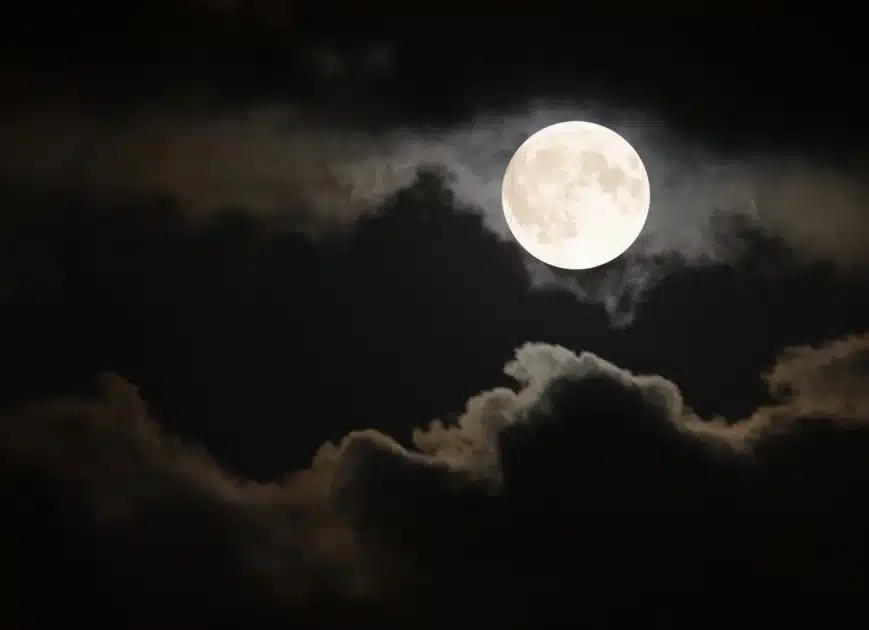The phrase “The moon is beautiful, isn’t it?” often heard in Japanese conversations and popular culture, carries a depth of meaning and cultural significance. This article delves into the origins, interpretation, and appropriate responses to this seemingly simple yet profoundly poetic statement. Whether you’re a language enthusiast, a fan of Japanese culture, or simply someone who appreciates the moon’s beauty, understanding this phrase can add a new layer to your appreciation of language and culture.
- RELATED: Who Is Niall Horan’s Girlfriend? Meet Amelia Woolley
- RELATED; Who is Shane Gillis’ Girlfriend? His Relationship History Explored
- RELATED: Who Is Austin Reaves’ Girlfriend? Meet Jenna Barber
- RELATED: Who Is Bobby Flay’s Girlfriend? Meet Christina Pérez
Table of Contents
“The moon is beautiful isn’t it?” Meaning
The phrase “The moon is beautiful, isn’t it?” extends beyond a mere appreciation of the moon’s beauty. In Japan, it is often considered a poetic and indirect way of expressing affection, sometimes even romantic love. This nuanced way of communication reflects the cultural tendency towards subtlety and indirect expression, particularly in matters of the heart.
Where did this phrase come from?
The phrase’s origin is attributed to the famous Japanese novelist Natsume Sōseki, who suggested using this phrase as a more nuanced way to translate the Western concept of saying “I love you.” In Japanese culture, which values indirect communication, this phrase became a symbolic and poetic expression of love and affection.
How to respond “The moon is beautiful, isn’t it?”
When someone says “The moon is beautiful, isn’t it?” they might be expressing more than just admiration for the night sky. Depending on the context and your relationship with the person, responses can range from a simple agreement about the moon’s beauty to a more profound acknowledgment of shared feelings. Some appropriate responses include agreeing with the statement, commenting on the moon’s beauty, or even replying in a manner that acknowledges the underlying sentiment.
Reasons behind using the “The moon is beautiful, isn’t it?”
This phrase exemplifies the Japanese aesthetic of expressing emotions in a subdued yet meaningful way. It reflects the deep connection Japanese culture has with nature and the importance of non-verbal communication in expressing feelings. Using this phrase also signifies a shared understanding and appreciation of beauty, both in nature and in human emotions.
- RELATED: Jay Cutler Ex-Wife: Reality TV Meets Football, Kristin Cavallari
- RELATED: CM Punk Wife: Wrestling with Love for AJ Mendez
- RELATED: Reggie Miller Wife: Scoring in His Personal Life
- RELATED: Winston Duke Wife: Exploring His Personal Life
Conclusion
“The moon is beautiful, isn’t it?” is more than just a comment on a celestial body; it’s a window into the subtleties of Japanese communication and a reflection of the culture’s deep connection with nature and emotion. This phrase reminds us of the beauty of indirect expression and the power of words to convey much more than their literal meaning.
FAQs About The Moon Is Beautiful, Isn’t It?
- Q1: What does it mean when they say, “The moon is beautiful, isn’t it?”
A1: When someone says “The moon is beautiful, isn’t it?” in a Japanese context, it can be an indirect way of expressing affection or romantic interest, reflecting the cultural preference for subtlety in conveying emotions. - Q2: What should I reply to, “The moon is beautiful, isn’t it?”
A2: Your response can vary based on your feelings and the context. It can be a simple agreement, a poetic expression about the moon, or a subtle acknowledgment of the underlying sentiment if you sense it’s being used in a romantic context. - Q3: What does “The moon is beautiful tonight” mean?
A3: Similar to “The moon is beautiful, isn’t it?”, saying “The moon is beautiful tonight” can be an indirect way of pointing out something beautiful, and in certain contexts, it might imply deeper, unspoken emotions. - Q4: What does the moon mean in love?
A4: In many cultures, including Japanese, the moon is often associated with love and romance. It symbolizes beauty, mystery, and a kind of emotional connection that goes beyond words, making it a fitting metaphor in romantic contexts.


Comments